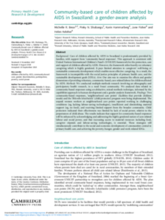Abstract
Background: Care of children affected by AIDS in Swaziland is predominately provided by families, with support from ‘community-based responses’. This approach is consistent with United Nations International Children’s Fund’s (UNICEF) framework for the protection, care and support of children affected by AIDS. However, the framework relies heavily on voluntary caregiving which is highly gendered. It pays limited attention to caregivers’ well-being or sustainable community development which enables more effective caregiving. As a result, the framework is incompatible with the social justice principles of primary health care, and the sustainable development goals (SDGs). Aim: Our aim was to examine the effects and gender dimensions of providing voluntary, community-based, care-related labour for children affected by AIDS. Methods: We conducted multiple-methods research involving an ethnography and participatory health research, in a rural Swazi community. We analysed data related to community-based responses using an abductive, mixed-methods technique, informed by the capabilities approach to human development and a gender analysis framework. Findings: Two community-based responses, ‘neighbourhood care points’ (facilities that provide children meals) and the ‘lihlombe lekukhalela’ (child protector) program were being implemented. The unpaid women workers at neighbourhood care points reported working in challenging conditions (eg, lacking labour-saving technologies), insufficient and diminishing material support (eg, no food), and receiving limited support from the broader community. Child protectors indicated their effectiveness was limited by lack of social power, relative to the perpetrators of child abuse. The results indicate that support for community-based responses will be enhanced by acknowledging and addressing the highly gendered nature of care-related labour and social power, and that increasing access to material resources including food, caregiver stipends and labour-saving technologies, is essential. These strategies will simultaneously contribute to the social and economic development of communities central to primary health care, and achieving the poverty, hunger, gender and work-related SDGs.

